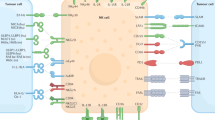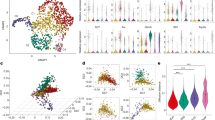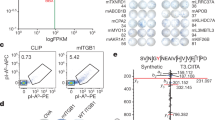Abstract
Mouse teratocarcinomas are tumours of the germ cells1 whose tumorigenicity is a property of a pluripotent stem cell type denoted the embryonal carcinoma (EC) cell. These cells seem to be analogous to cells of the early mouse embryo and will indeed contribute to the normal development of a mouse if injected into blastocysts2. EC cells display an unusual transplantation behaviour and can frequently be grafted, giving tumours in several different mouse strains3. Thus, the protective immune mechanisms against such tumours may be less efficient than, and/or of a different nature from, those against most other tissues. Cytolytic T cells generally fail to kill EC cells4–6, although there is one report of the apparent induction of specific anti-EC T-killer cells7. The failures4–6 are easily explained as being due to the absence of major histocompatibility complex (MHC) products on the surface of ECs3,8. Recently, however, a new cell type, the natural killer (NK) cell, has been shown to have potent lytic activity when tested against several tumour targets9–11. Targets of NK cells also include normal thymocytes12 and certain stem cells of the bone marrow13. As NK cells seem to display a select but distinct specificity pattern from T lymphocytes and because NK targets include normal cells at an ‘immature’ stage of differentiation, we considered it possible that NK cells provide an alternative to T cells in producing cell-mediated immune reactions against teratocarcinomas. Here we report that murine NK cells are highly efficient cytolytic aggressors to EC cells whereas more differentiated cell lines derived from the latter are less susceptible or completely resistant.
This is a preview of subscription content, access via your institution
Access options
Subscribe to this journal
Receive 51 print issues and online access
$199.00 per year
only $3.90 per issue
Buy this article
- Purchase on Springer Link
- Instant access to full article PDF
Prices may be subject to local taxes which are calculated during checkout
Similar content being viewed by others
References
Martin, G. R. Cell 5, 229–243 (1975).
Mintz, B., Illmense, K. & Gearhart, J. D. in Roche Symp. on Teratomas and Differentiation (eds Sherman, M. & Solter, D.) 45 (Academic, New York, 1975).
Artzt, K. & Jacob, F. Transplantation 17, 632–634 (1974).
Forman, J. & Vitetta, E. S. Proc. natn. Acad. Sci. U.S.A. 72, 3661–3665 (1975).
Zinkernagel, R. M. & Oldstone, M. B. O. Proc. natn. Acad. Sci. U.S.A. 73, 3666–3670 (1976).
Doherty, P. C., Solter, D. & Knowles, B. B. Nature 266, 361–362 (1977).
Wagner, H., Starzinski-Powitz, A., Rollinghoff, M., Golstein, P. & Jakob, M. J. J. exp. Med. 147, 251–264 (1978).
Stern, P., Martin, G. R. & Evans, M. J. Cell 6, 455–465 (1975).
Herberman, R. B., Nunn, M. E., Holden, H. T. & Lavrin, D. H. Int. J. Cancer 16, 230–239 (1975).
Kiessling, R. & Wigzell, H. Immun. Rev. 44, 165–208 (1979).
Kiessling, R., Klein, E. & Wigzell, H. Eur. J. Immun. 5, 112–117 (1975).
Hansson, M., Kiessling, R., Andersson, B., Kärre, K. & Roder, J. Nature 278, 174–176 (1979).
Kiessling, R. et al. Eur. J. Immun. 7, 655–660 (1977).
Herberman, R. B. & Holden, H. T. Adv. Cancer Res. 27, 305–377 (1978).
Gidlund, M., Örn, A., Wigzell, H., Senik, A. & Gresser, I. Nature 273, 759–761 (1978).
Kasai, M., Iwamori, M., Nagai, Y., Okumura, K. & Tada, T. J. Immun. (in the press).
Brondz, B. D. Transplant Rev. 10, 112–151 (1972).
Avner, P. R. et al. Immunogenetics 7, 103–115 (1978).
Siegler, E. L., Tick, N., Teresky, A. K., Rosenstraus, M. & Levine, A. J. Immunogenetics 9, 207–220 (1979).
Adamson, E. D., Gaunt, S. J. & Graham, C. F. Cell 17, 469–476 (1979).
Kiessling, R. et al. J. exp. Med. 143, 772–780 (1976).
Stern, P. L. Cell 14, 775–783 (1978).
Welsh, K. I., Dorval, G. & Wigzell, H. Nature 254, 67 (1975).
Lehman, J. M., Speers, W. C., Swartzendruber, D. E. & Pierce, G. B. J. cell. Physiol. 84, 13–28 (1974).
Adamson, E. D., Evans, M. J., Magrane, G. G. Eur. J. Biochem. 79, 607–615 (1977).
Solter, D., Shevinsky, L., Knowles, B. B. & Strickland, S. Devl Biol. 70, 515–521 (1979).
Author information
Authors and Affiliations
Rights and permissions
About this article
Cite this article
Stern, P., Gidlund, M., Örn, A. et al. Natural killer cells mediate lysis of embryonal carcinoma cells lacking MHC. Nature 285, 341–342 (1980). https://doi.org/10.1038/285341a0
Received:
Accepted:
Issue Date:
DOI: https://doi.org/10.1038/285341a0
This article is cited by
-
Effects of histocompatibility and host immune responses on the tumorigenicity of pluripotent stem cells
Seminars in Immunopathology (2011)
-
Natural killer cell recognition of missing self
Nature Immunology (2008)
-
The in vivo clearance of Ha-ras transformants by natural killer cells
Clinical & Experimental Metastasis (1990)
-
NK-mediated reduction of malignancy in human melanoma cells treated with theophylline
Clinical & Experimental Metastasis (1987)
-
Selective rejection of H–2-deficient lymphoma variants suggests alternative immune defence strategy
Nature (1986)
Comments
By submitting a comment you agree to abide by our Terms and Community Guidelines. If you find something abusive or that does not comply with our terms or guidelines please flag it as inappropriate.



